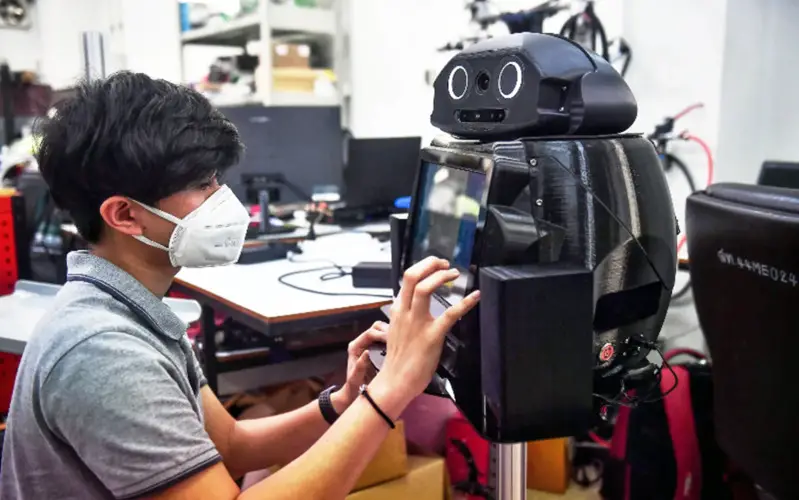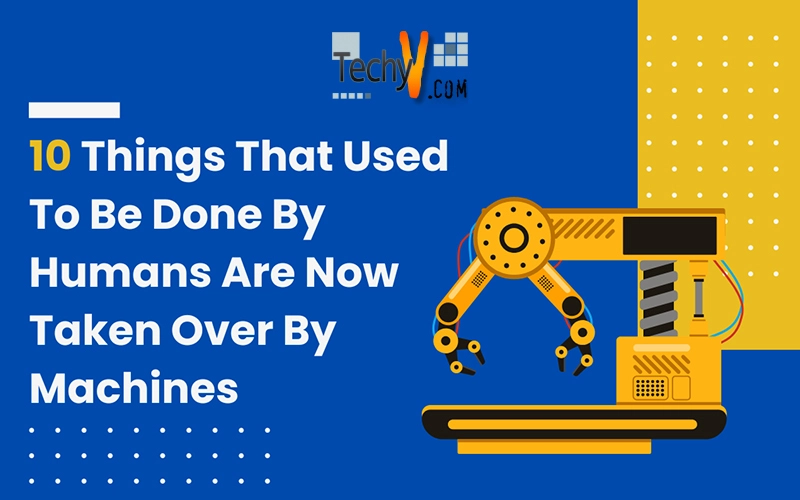The adoption of automation and artificial intelligence technologies in various industries has led to the replacement of many tasks that were once performed by humans with machines. This includes assembly line tasks, self-driving cars, trucks, and drones, as well as chatbots and virtual assistants. Even traditionally human-driven jobs like agriculture, medical diagnosis, and writing are now being performed by automated systems and machine learning algorithms. However, this trend is also raising concerns about the displacement of human workers and the potential consequences for society as a whole.
1. Manufacturing
Yes, indeed many manufacturing processes that were once done by humans are now being taken over by machines. This is due to the advancements in technology and the development of automation systems. In the past, many manufacturing processes required a lot of manual labour, which could be time-consuming and inefficient. With the advent of machines and automation, these processes can now be done more quickly and accurately, with less room for error. Additionally, the use of machines in manufacturing has also led to increased production capacity and cost savings for companies, which can then be passed on to consumers in the form of lower prices or improved product quality.

2. Transportation
The advancement of technology has led to a significant shift in the way transportation is carried out. Machines are now capable of performing tasks that were once reserved for humans, from operating vehicles to managing logistics. This shift has not only increased efficiency and productivity but also reduced the need for human labour in certain areas. While there are concerns about job displacement, the use of machines in transportation has undoubtedly changed the industry for the better.

3. Data Entry And Processing
The rise of automation and artificial intelligence has transformed many industries, including data entry and processing. With the development of advanced software and machine learning algorithms, tasks that were once performed by humans, such as data entry, transcription, and data processing, are now being taken over by machines. This shift has led to increased efficiency, accuracy, and speed in data processing, while also reducing costs and freeing up human resources for more complex tasks.

4. Customer Service
With the increasing use of technology, many tasks that were once performed by humans are now being taken over by machines, and customer service is no exception. Chatbots, automated voice systems labour and other AI-powered tools are now commonly used to handle customer inquiries, complaints, and even purchases. While this shift has its benefits, such as increased efficiency and cost savings, it also raises concerns about the loss of the human touch and personalized service that customers often value. Therefore, it is important to strike a balance between automation and human interaction in customer service to ensure that customers are satisfied and their needs are met.

5. Cleaning
The advent of technology has led to significant changes in many industries, and cleaning is no exception. Machines and robots are now capable of taking over tasks that were once done exclusively by humans. With advances in robotics and artificial intelligence, cleaning has become more efficient, effective, and precise, resulting in cleaner environments and improved health outcomes. From autonomous vacuums to smart mops, the cleaning industry has been transformed by machines and technology.

6. Agriculture
With advancements in technology, various tasks in agriculture that were previously done manually by humans are now being taken over by machines. This includes tasks such as planting, harvesting, and even milking cows. These machines are not only more efficient but also reduce the need for human labour, ultimately leading to increased productivity and profitability in the agriculture industry. However, this shift towards automation also raises concerns about job displacement and the potential impact on rural communities.

7. Security
The rise of artificial intelligence has brought about a significant shift in the field of security. Tasks that were once carried out by human operators are now being replaced by machines equipped with advanced algorithms and automation capabilities. This includes tasks such as surveillance, intrusion detection, threat analysis, and response. With the ability to process large amounts of data quickly and accurately, machines can identify and respond to security threats more efficiently and effectively than humans. However, it is important to note that humans still play a critical role in setting up and monitoring these AI-based security systems to ensure that they are functioning properly and making appropriate decisions.

8. Stock Trading
With the rise of artificial intelligence and machine learning, the world of stock trading has been transformed. What used to be done by humans with paper and pen is now being taken over by machines that can analyze vast amounts of data in real time. These machines can make trades based on complex algorithms and predictive models, often with greater speed and accuracy than humans. As a result, human traders are becoming increasingly rare, and the industry is becoming more reliant on machines.

9. Medical Diagnoses
Advancements in machine learning and artificial intelligence have enabled machines to perform medical diagnoses that were previously done by humans. With access to vast amounts of patient data, AI algorithms can identify patterns and make accurate diagnoses faster than humans. This has resulted in faster and more efficient healthcare, with the potential to save countless lives. However, it is important to ensure that these algorithms are rigorously tested and validated before being implemented in medical practice.

10. Writing
Advances in Artificial Intelligence have revolutionized the way we produce and consume written content. From news articles and marketing copy to legal documents and technical manuals, many forms of writing that were once the exclusive domain of humans are now being automated by machines, using natural language processing, machine learning, and other AI technologies. While some worry that this trend will lead to widespread job loss and a decline in writing quality, others see it as an opportunity to enhance efficiency and free up human creativity.



















